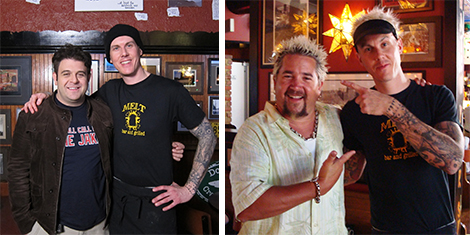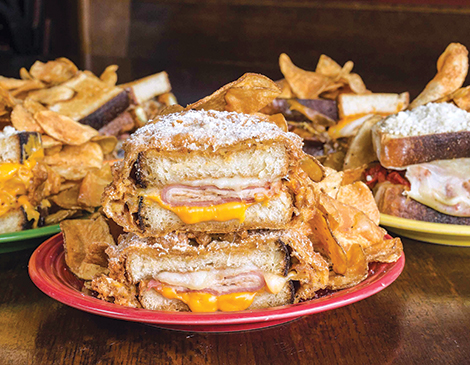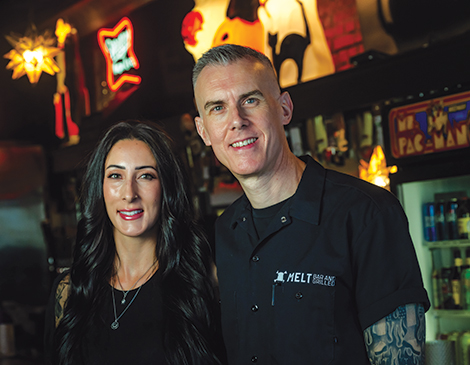The New Melt Bar and Grilled: Matt Fish’s Journey Brings Him Back to Where He Started
by Annie Nickoloff | Dec. 4, 2024 | 10:00 AM

Ken Blaze, Courtesy Matt Fish
Editor's note: On Jan. 1, 2025, Melt owner Matt Fish announced that the final location of Melt Bar and Grilled permanently closed.
Guy Fieri’s mouth is full of pierogi and bread and cabbage and cheese.
“Oh man,” he says, muffled by his chomping, “out of bounds!"
He’s taken a bite of a creation called the “Parmageddon,” and the restaurant’s owner, a young Matt Fish, nods at the frosted-tipped Food Network host. They’re crammed into the Lakewood Melt Bar and Grilled’s kitchen on this feature in the eighth season of Diners, Drive-Ins and Dives, airing on Feb. 8, 2010.
“That is one of the best grilled cheeses I ever had,” a greasy cheeked Fieri proclaims.
Fieri is here just a few years after the Lakewood Melt opened. His big bites and loud chewing are the brand’s first introduction to primetime national TV. In one scene, Fish flambes a few pierogies over the stove, flames dancing across the pan. The chef’s snarling tattoo of Kiss singer Gene Simmons, on the back of his arm, is visible.
It’s different, for a Food Network show. It’s punk. It’s Cleveland.
In the episode, Fieri slaps his hands together. “I tell you: Michael Symon, Eric [Williams] at Momocho, Heather [Haviland] at Lucky’s —” (a grill sizzles behind his voice) “— and now, this guy? I don’t know about this town. Crazy people.”
Soon, a new food icon is born.

(Photo courtesy Matt Fish)
Three months after this episode airs, Melt will unveil its second eatery in Cleveland Heights. A month later, it will appear on Man v. Food. The next year, Fish will open his third spot and be on The Best Thing I Ever Ate, and Cleveland Scene readers will vote Melt the Best Restaurant in Cleveland.
Fish will launch a total of 14 locations across Ohio, including at Progressive Field, Cedar Point and even a short-lived spot in Downtown Cleveland’s Public Square The company will hire 350 employees between eateries, a production facility and a corporate office. More than 1,000 fans of the restaurant will get Melt-themed tattoos permanently etched into their skin. Fish will begin to negotiate leases on Melt’s first out-of-state spots, in Detroit and Pittsburgh. It will inch from humble beginnings and balloon into something bigger, and bigger, and bigger.
And then, it will fall apart.
Fish sits, on a recent Thursday, in a booth near the front window, taking a break from his kitchen shift at the original Melt Bar and Grilled location. It’s the only one left. Since the pandemic, Fish’s other restaurants shuttered, falling like dominoes.
The chef-owner takes a gulp of hot black coffee. He’s got more tattoos on his arms; more lines on his face than when he started Melt nearly two decades ago. Since Melt came into the picture, Fish’s life has grown more complicated. He’s got a wife (his second marriage) and two young children now. On this day, the restaurant is slow at 5 p.m., but he says it’ll pick up soon. His hair is slicked away in a short, gray cut. He wears an all-black outfit and scuffed, greasy shoes.
In recent months, a handful of former landlords and suppliers filed lawsuits for broken leases and missed payments. Customers complained of a drop in quality, from cut corners in sourcing products after the chain closed its commercial kitchen. The company shrank to just 18 employees.
Former office manager Kym Mitchell was hired just before the pandemic, then let go this past August. “We worked really hard to do everything we could do to keep Melt afloat,” Mitchell says. “I will tell you that this was the hardest four years of my life for a career. But it was also a very rewarding four years of my life.”
RELATED: Restaurants in Cleveland Still Face Post-Pandemic Challenges
Melt’s rapid string of closures punctuated what was, in reality, a slow shift in dining habits and neighborhood dynamics, both accelerated by the pandemic. Rising labor and food costs aside, a steepening demand for takeout and an emphasis on healthy eating habits meant that, soon, Melt’s big sandwiches didn’t fit into the diets of former regulars.
And soon, Fish watched the empire he’d built over his adult life crumble.
The downfall cascaded to one pivotal decision, when Fish filed for Chapter 11 bankruptcy in June. Unlike Chapter 7 bankruptcy, where businesses liquidate, Chapter 11 allows a reorganization to restructure debts.
“You don’t get a lot of second chances in life, you know?” Fish says. “Fortunately, I got one. I’m gonna do my best to make sure it works.”
At work, he moves quickly. He cleans. He washes dishes. He preps. He cooks. He oscillates between the blazing-hot kitchen grill and the basement’s icy walk-in freezers, his long legs striding up and down, up and down, the restaurant’s steps.
His 6-foot-4 frame stoops under the prep room’s low ceilings. He lugs classic Melt makings like bread and cheese and buckets of thick-cut fries. There are different dishes, too — onion hummus, local pasta, chimichurri, crab cakes, cuts of meat from a butcher down the street. Health-conscious, vegan — considerations on a menu he overhauled in September. This new menu is printed on long plastic sheets, no longer plastered to the backs of old record sleeves.
A year ago, Fish and Melt’s chief operating officer Neil Sanchez were in an office, confined to administrative work for the fleet of shops. Now, they take turns running Lakewood’s day-to-day. “We make everything from scratch, but it’s a small enough menu that there are five of us working in the kitchen, and we can execute all the prep, all the cooking, all the cleaning, all the ordering,” Sanchez says.
The new vision means a new interior, too; Fish closed up shop for one week to deep-clean every corner, replace the furniture and install wood paneling. He kept the characteristic plastic blow-mold Halloween and Christmas characters posed above the bar, along with the hanging modular glass star lights.
“Melt was gonna close in three years, if not less, if I didn’t do this, because the brand was played out,” Fish says. “We tried everything we could to make Melt Bar and Grilled, as is, work, and the only way to make it work was to not make it work.”
Don’t get it twisted: The Melt identity is here. It’s just grown-up.
You can still order the Parmageddon. These days, it’s served with a big, locally sourced pierogi from Rudy’s Strudel and Bakery in Parma, Fish’s hometown. It’s still topped with cidery cabbage piled on two greasy slices of bread.
“We’re back to the basics, where we prep in our own kitchen,” Fish says. “I can honestly say the quality is back to as good, or better, than it was when we first started.”
But a question remains: Will this new version of Melt catch on like it did 18 years ago?
Time will tell. On this Thursday evening, a pair of customers step inside. They sit and scan menus in the otherwise-empty restaurant.
Even in the middle of turning points, there’s something constant about Matt Fish. He’s a workaholic and always has been, says Matt Bene. Bene saw an early example of the “Fish marketing machine” when Fish drafted a release strategy for their seventh-grade rock duo called “Inferno,” selling home-recorded tapes of crappy Kiss covers to classmates.
Later, they formed Whatever — and Fish promoted the punk group up to local and national renown. The band reunited last year after a 25-year hiatus.
“Music was always my first passion and still is, but it doesn’t pay the bills,” Fish says, “and restaurants sort of, sometimes, pay the bills.”
You could see and hear the young version of Fish inside the young version of Melt. Like the bar, the four walls of his childhood room were plastered with stickers, flyers, vintage ads and oddball toys. Melt’s background music has mixed rock, new-wave, punk and indie tunes from the ’60s to today — much like Fish’s shelves of tapes and CDs. “He was always quirky.” Bene laughs. “His room at home looked a lot like that original Melt. It was him, through and through.”
In that Parma childhood bedroom, Bene and Fish’s music grew up with them. It stuck with Fish when he graduated from Lutheran West in Rocky River in ’91. It took Whatever on a half-dozen tours of the United States and two across Europe. The group opened up for prominent acts like Rancid, Pennywise and Jawbox; it got a record deal with punk-famous Dr. Strange Records, giving the band a national boost.
Fish was a big reason why. “You need the songs. You need the talent. You need the drive,” Bene says, “but you also have to have somebody that knows how to make these connections and build relationships and organize and get things done. And that is his superpower. Always has been.”
Fish is busy now; he was then, too. He spent days stocking shelves at Marc’s grocery stores. At night, he went to band practice, or shows, or to Rocky’s Pizza in Parma, where a girlfriend worked the night shift and where he’d occasionally help with orders and deliveries. The hot pizza kitchen was Fish’s first pull to restaurants — then came culinary school at Cuyahoga Community College. He supplemented his punk nights with days working in local eateries like Johnny Mango World Cafe & Bar, a spot that inspired Fish’s vision for a place of his own.

(Photo courtesy Matt Fish)
Before all that ramped up, Whatever called it quits in late 1998. Bene was the first to pull away, forcing music into the backseat. Fish didn’t. The year Whatever broke up, he joined The Chargers Street Gang and played with the on- and off-again rock group for more than two decades.
And in the middle of that, in 2006, the old Bud’s White Door saloon went up for sale. It was across the street from the Lakewood Arabica coffee shop (now a Chipotle) that Fish frequented in the ’90s punk scene. With an idea for his own craft beer spot and restaurant, he snapped it up. Melt soon absorbed Fish’s focus, but music never left his plate.
After all, hammering the drumset, the raw intensity of it, has always been an outlet. It’s essential. “Music is a release,” he says. “It’s aggression; it’s something completely different than what I do on a day-to-day basis.”
That’s why, a few years ago, when Bene and Fish started to consider bringing Whatever back to the dead, it was an instant “yes.”
That’s why, even as Fish shuttered most Melt locations and returned to 80-hour work weeks, he still yanks himself out of the kitchen by 6 or 7 p.m. every Thursday for band practice.
There, he pounds out frenetic heartbeats on old Whatever songs with titles like “Me Against The World” and “Something New.” And you’ll hear Fish on a fresh batch of 12 fast-paced rippers from Whatever’s upcoming album, due in 2025, recorded with acclaimed Jawbox frontman J. Robbins in Baltimore this past summer.
But, yeah: Outside of music, Fish is going through a lot. His bandmates see it. “With the relaunch of the new restaurant, I knew that he was very busy and that this was very important to him, and we all want to support him,” Bene says. “I mentioned at practice, ‘Maybe we should take a little hiatus while you get this thing underway. I know you’re busy.’ And without hesitation, he said, ‘Absolutely not. I need this.’”
For a long time, Matt Fish knew how to prioritize his life: music and business. It was hard work and long hours getting a restaurant open in the 2000s — but it clicked for the chef. “I told everybody when I opened Melt: Plan to not see me for two or three years,” he says. “If you want to find me, you know where to find me.”
Jessica Fish happened to find him there. A year or two after Melt opened, she escaped a blustery cold Lakewood sidewalk with a friend and stepped inside the restaurant. “I remember feeling enveloped in warmth and music and the loud clamoring that comes from a restaurant, and it just felt good,” she says. “I don’t remember what I ordered or what I ate. I just remember thinking how cool of a place it was, and then seeing Matt come out to say hi to us, and being like, ‘Oh my God, hello.’”

(Photo by Ken Blaze)
The two were in relationships at the time, but Jessica says Matt was a “crush at first sight.” Then, in late 2012, when they both happened to be single, they hit it off over a weekend in Cleveland spent with a mutual friend. Jessica returned to New York City to complete culinary school, and Matt eagerly messaged her the first in a string of daily chats.
By early 2013, she made the leap, moving in with Matt in his Lakewood home. On Oct. 1, 2016, they married in Monterey Bay, California, where Jessica grew up. Two years later, they had their son, Felix, and three years after that, their daughter, Zoey. Then, the family relocated to Valley View.
Matt, now 51, originally didn’t plan on having kids. He knew how taxing the restaurant industry could be and how he exists within it. “I know what my personality is,” he says. “I know the person I am, and I didn’t want to raise my kids from a distance.”
These days, he wakes up early, at 6:30 a.m. every weekday, even if he worked until close the night before. He makes sure to walk Felix to the bus stop. It’s important, he says. Sometimes, it’s the only time of day he gets to spend with his son. “Truthfully, I need them probably more than they need me,” Matt says about his kids. “They keep me grounded.”
While Matt solidifies the ins and outs of Melt’s rebrand, Jessica has adjusted to the demands of primary parenting. She pitches in for the business, too, baking hundreds of ooey-gooey chocolate chip cookies with a hint of sea salt for the restaurant’s dessert menu every week, using a recipe she’s honed over the past seven years. She also manages Melt’s social media, where, lately, she’s busy fielding divisive comments around the restaurant’s updates. Beyond the trolls, criticisms revolve around the decor shift, around the rebranded concept’s “pretentiousness” and “douchebag ingredients.” (“Most of the ingredients that we are using in our current menu are the same ingredients that we’ve been using for the last 18 years,” she says, annoyed. “We’re talking about jalapeno and cilantro here.”)
Both of the Fishes acknowledge that Melt’s changes aren’t for everyone. They’re designed to cater to people who have, like Matt, grown up with the brand.
RELATED: Melt Bar & Grilled Celebrates a Decade of Foodie Fame
For Matt, a big part of growing up meant letting go of Melt’s statewide, multi-store operation. While he originally planned to whittle things down to three Melts in the company’s reorganization, he decided to shutter Mentor and Akron in late August — leaving just Lakewood. The restaurant that started it all.
“I was not happy at all owning 13, five, three stores,” Fish says. “I hadn’t been happy in years running Melt, because I was doing it because I had to, not because I wanted to. I’m finally doing this because I want to again.”
Now, he’s back to one hot kitchen. Back to from-scratch, locally sourced, chef-driven plates. Back to where he began.
“It’s hard work, but it’s fun work. That’s the restaurant industry. I still love it,” he says, with a short pause. “I hate it. But I love it.”
On a recent Friday evening, the 18-year-old eatery slowly comes alive as an older crowd, a noticeably not rowdy crowd, trickles in.
Couples, dressed for date night, order glasses of wine. Friends at a booth grab a couple of appetizers at the end of a long work week. A mother and daughter sip craft cocktails near the window that overlooks Detroit Avenue.
They’re seated at tables that don’t have white tablecloths. But they do have live candles. They flicker under the hum of rock music in the background, in a room of smells and tastes and years of memories — including this one, right now: a steady dinner rush at the new Melt.
For more updates about Cleveland, sign up for our Cleveland Magazine Daily newsletter, delivered to your inbox six times a week.
Cleveland Magazine is also available in print, publishing 12 times a year with immersive features, helpful guides and beautiful photography and design.

Annie Nickoloff
Annie Nickoloff is the senior editor of Cleveland Magazine. She has written for a variety of publications, including The Plain Dealer, Alternative Press Magazine, Belt Magazine, USA Today and Paste Magazine. She hosts a weekly indie radio show called Sunny Day on WRUW FM 91.1 Cleveland and enjoys frequenting Cleveland's music venues, hiking trails and pinball arcades.
Trending
-
1
-
2
-
3
-
4
-
5










